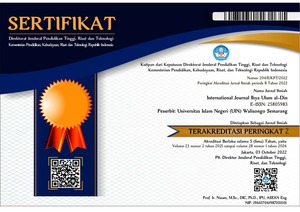MEMAHAMI KEMBALI PEMAKNAAN HADIS QUDSI
DOI:
https://doi.org/10.21580/ihya.17.2.1734Keywords:
Al-Qur'an, Hadith Nabawi, Hadith QudsiAbstract
The scholars of hadith have different viewpoints in understanding the meaning of hadith Qudsi. The differences are affected by understanding of the concept of hadith Qudsi that is the the word of Allah conveyed through the words of the Prophet Muhammad. However, Hadith Qudsi is not like the Qur'an. This article will briefly show an understanding of hadith Qudsi and the Qur'an; and hadith Qudsi and Hadith Nabawi. The author agree with a view of the scholars of hadith who says that, the Hadith Qudsi is a special Hadith verbalized by Prophet both meaning and pronunciation. Therefore, there are no differences between Hadith Qudsi and the sayings of the Prophet in general. The Prophetic Hadith is classified into authentic hadith, hasan and da’eef; can also be found in hadith Qudsi. There may be some differences, in which Hadith Qudsi is not wider than Hadith Nabawi. Hadith Qudsi is not direct words of God, but only the ideas and then verbalized by the prophet himself.---
Para ulama hadis memiliki sudut pandang yang berbeda dalam memahami makna hadits Qudsi. Perbedaan tersebut dipengaruhi oleh pemahaman konsep hadis Qudsi yaitu firman Allah yang disampaikan melalui firman Nabi Muhammad SAW. Namun, Hadis Qudsi tidak seperti Alquran. Artikel ini akan secara singkat menunjukkan pemahaman tentang hadits Qudsi dan Alquran; Dan hadis Qudsi dan Hadis Nabawi. Penulis setuju dengan pandangan para ulama hadis yang mengatakan bahwa, Hadis Qudsi adalah Hadis khusus yang diucapkan secara verbal oleh Nabi baik makna maupun pengucapannya. Oleh karena itu, tidak ada perbedaan antara Hadis Qudsi dan perkataan Nabi pada umumnya. Hadis Nabi diklasifikasikan ke dalam hadits, hasan dan da'eef yang otentik; Bisa juga ditemukan dalam hadis Qudsi. Mungkin ada beberapa perbedaan, di mana Hadis Qudsi tidak lebih luas dari Hadis Nabawi. Hadits Qudsi bukanlah kata-kata langsung dari Tuhan, tapi hanya gagasan dan kemudian diucapkan secara verbal oleh nabi sendiri.
Downloads
References
Abu Hamim al-Ghazali, Al-Munqidz min al-Dlalal, (Cairo: Silsilah Tsaqafat Islamiyah, 1961).
Abul Husain Muslim bin Hajaj, al-jāmi’ al-Saḥīḥ, (Bairut: Dār Jail, 1334 H).
Abu Ja’far At-Ṭabari, Jāmi’ al-Bayaān fī Ta’wīl al-Qur;an, Muassasah al-Risālah, 2000.
Al-Bukāri, Muhammad bin Ismail. al-Jāmi’ as-Ṣahihal-Mukhtaṣar, (Bairut: Dār Ibn Katsir, 1987).
Al-‘Aṡīmi, Muhammad bin Salih bin Muhammad, Majmu’ Fatāwa wa Rasāil, (Dār al-Waṭan, 2001).
Al’Aini, Badruddin, Umdatul Qari Syarh Saḥiḥ al-Bukhari, (Multaqa ahli al-Hadis, 2006).
Al-Albani, Muhammad Nasiruddin, Ḍa’ifal-Tarhīb wa al-Tarhīb, (Riyad: Maktabah al-Ma’arif, tt).
______, Sahih wa Ḍa’if al-Jami; al-Sahīr, (Iskandaria: Markaz Nur al-Islam, tt).
Al-‘Asqalani, Abu al-Fadl Ahmad bin ‘Ali bin Muhammad bin Hajar, (Yordan: Ta’rif ahli al-Taqdīs, Maktabah al-Manār, tth.).
______, Fathul Bariy Syarah Sahih al-Bukhariy, (Bairut: Dâr al-Ma’arif, tth.).
Al-Jurjani, ‘Ali bin Muhammad bin ‘Ali, al-Ta’rifāt, Bairut, (tt.: Dār al-Kitab al-‘Arabi, 1379 H).
Al-Qadi ‘Iyad, Ikmāl al-Mu’allim Syrh Shih Muslim, (tt., tp., tth.).
Al-Manawi, Muhammad Abdur Rauf, Faidul Qadīr Syarh al-Jami’ al-Sahīr, (Cet I, Bairut, Dār al-Kutub al-‘Ilmiyyah, 1994).
Andrew Rippin, “The Function of Asbab an-Nuzul Qur’anic Exegesis”, dalam Jurnal Studi al-Quran, Vol, I, No. 2, 2006
As-Syafî’i, Abi Abdillah Muhammad bin Idris, al-Um, (Bairut: Dār al-Fîkri, 1983).
______, Ikhtilaf al-Hadis, (Bairut: Dār al-Kutub al-‘Ilmiayyah,1986).
As-Ṣan’aniy, Abi Muhammadbin Isma’il bin Salah, Tadih al-Afkâr li ma’ani Tanqih al-Anżar, (Birut: Dâr al-Kutub al-’Ilmiyah, 1997).
Az-Zarqani, Muhammad Abdul ‘Aẓim, (tt: Mnāhil al’Irfān fī ‘Ulūm al-Qur’an, Matba’ah ‘Isa al-Bābi al-Halabi, tth.)..
‘Itr, Nur Ad-Din, Manhaj An-Naqd fî ‘Ulum al-Hadis, (Damaskus, tp., 1981).
Ibnu Taimiyyah, Taqyudin Abu al-‘Abbas Ahmad bin Abdul Halim, Majmu’ al-ftāwa, (Cet III, tt: Dār al-Wafa’, 2005).
Jonathan A.C. Brown, How We Know Early Ḥadīth Critics Did Matn Criticism and Why It’s So Hard to Find, Islamic Law and Society, 15 (2008) 143, www.brill.nl/ils.
Kamaruddin, Amin, Menguji Kembali Keakuratan Metode Kritik Hadis, Jakarta: PT Mizan Publika, 2009.
Manā’ al-Qattaan, Mbāhis fī ‘Ulum al-Hadis, Maktabah al-Ma’arif, 2000, Cet. III.
Muslim, Imam, Sahih Muslim, Bairut: Dār Ikhya al-Turaś al-‘Arabi, tt.
Nabia Abbott, Studies in Arabic Literary Papyri II: Qurʾānic Commentary and Tradition, Chicago: University of Chicago Press, 1967.
Nasr Hamid Abu Zaid, Naqd al-Khitab al-Diniy, Kairo: Sina’ Li al-Nasyr, 1992.
____,Tahdits al-Islam Aw Aslamat al-Hadatsah? dalam buku Cosmopolitanism: Identity and Authenticity in the Middle east, Editor; Raul Mayer, Surrey; Curzon Press, 1st Edition. 1999.
____,Mafhum al-Nash, Dirosah Fi ‘Ulum al-Qur’an, Beirut: Markaz al-Shaqafi al-‘Arabi, tt.
_____,dan Aster R. Nilson, 2004, Voice of an Exile: Reflections on Islam, London: Wesport Connecticut.
Nawir Yuslem, Ulumul Hadis, PT Mutiara Sumber Widya,2001.
Riḍa, Muhammad Rasyid bin ‘Ali, Tafsir al-Qur’an al-Hakīm, al-Hai’ah al-Misriyyah al-‘Ammah li al-Kitab, 1990.
Rahman, Fazlur; Islam, Chicago, University of Chicago Press, Cet. II, 1979.
_____, Major Themes of The Qur’an, Chicago, Bibliotheca Islamic, 1980.
Schacht, Joseph, the Origins of Muhammadan Jurisprudence, Oxford University Press, 1979.
Subkhi Shaleh,’Ulum al-Hadits wa Muṣṭalahuhu, Bairut: Dār al-‘Ilmi, 1978.
William A. Graham, Divine Word and Prophetic Word in Early Islam, Netherlands, Mouton & Co Printed, 1977.
Downloads
Published
How to Cite
Issue
Section
License
By submitting an article to the journal, the author(s) agree to transfer the published article's copyright to the journal, which will act as the publisher. This means the journal will have the right to publish the article in various forms, including reprints. The journal will maintain the publishing rights to the published articles.
This work is licensed under Creative Commons Attribution-ShareAlike 4.0 International License.
In line with the license, authors and third parties (readers, researchers, and others) are allowed to share and adapt the material. In addition, the material must be given appropriate credit, provided with a link to the license, and indicated if changes were made. If authors remix, transform or build upon the material, authors must distribute their contributions under the same license as the original.



